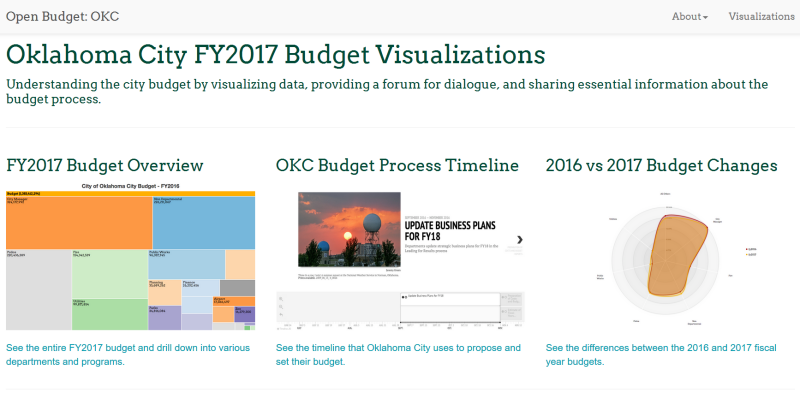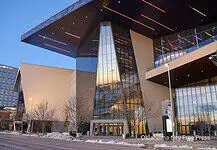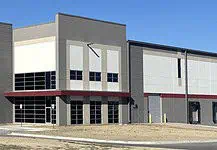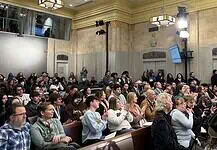Residents of The City of Oklahoma City now have clear visual and interactive access to how tax dollars are spent through the city’s budget. It’s because of a new website launched Friday.
They can see a clear time line of the current process and how the budget compares to previous years. It is the product of an all-volunteer group of computer code programmers who volunteered to work with city staff.
The website
The new website is called Open Budget: OKC.
Code for OKC is the group that produced the site after 11 months of working with Doug Dowler, city budget director and his staff. The group wants to give Oklahoma City residents easier contact with the workings of their city.
The visualizations are interactive. Residents can stay general in their viewing of the $1.3 billion budget or dig deeper with just a few clicks in an easy-to-read format.
Previously, the city had put the budget up on its website for public access, but it required residents to pour through technical budget data spreadsheets and PDFs. It was accurate and available, but inviting to only the wonkiest viewer.
The webpage also has visualizations of the budget process currently underway. Oklahoma City allows residents to weigh in on the budget at numerous points in the process each year.
Startup
Code for OKC was started Oct. 27, 2014 when they held their first gathering. They first met with city budget staff in February 2016 to begin the process of coming up with a better way for residents to get a visual representation of their city’s budget.
Free Press sat down with Matt Chandler and Jeremy Green the next day after the website launch. They have been the organizers, even though they are careful to say that many others have been crucial to the process.
“It was other people besides me and Jeremy that got the whole idea going for Code for OKC,” said Chandler. “We just happened to be the ones who took off with it and started it officially.”
Green said that he got involved because “I liked what I was seeing other cities do.”
The buzz in Oklahoma City was due to previous successes of Code for America local affiliates called “brigades.”
Code for OKC is a local brigade of Code for America, a national group supporting this kind of civic engagement. Their website reports that they have worked with over “100 local governments across the U.S.”
Other members of the team are Catherine Lippert, Scott Maslar, and Scott Murphey. Eight others contributed to the project.
City staff
Zach Nash is the Creative Manager for the City of Oklahoma City. He was at the center of designing a new, more interactive website for the city launched in May 2016.
And he was the first of many city staff to reach out to Code for OKC when they first filed Freedom of Information Act (FOIA) requests.
“It was exciting because I knew about Code for America,” said Nash. “I’d been following them for years. We actually have sat down with the national group once before.”
“When I heard that there was a local brigade, it was exciting,” said Nash.
Doug Dowler, city budget director, has spend the most time working with Code for OKC. He was a willing partner with them from the beginning.
He described the Open Budget OKC website as being “another tool for residents to see where their tax dollars are going at the city level” and easily see specifics of the budget and process.
“At another level, I’m excited that there are people this invested and interested and making government more accessible to our citizens,” Dowler said.
Civic hacking
It’s called “civic hacking.” And it’s a far cry from the “black hat” type of hacking that is featured in so many movies.
Movies often show a hacker working at lightning speed – never once having to go back and correct a typo, by the way – and magically shutting down the stock exchange, starting a nuclear weapons launch sequence or stealing billions from someone’s bank account.
But, in real life, writing or editing code is a painstaking process taking days of careful work to get right.
Programmers are quick to say that actual code hacking is the process of making various kinds of information and code work together.
Civic hacking is a way for people to use their programming experience and skills to benefit the public at large.
Such was the case for those working with Code for OKC.
Chandler said that it was a lot more of a process than they first thought. “The city puts out a budget book each year 630 pages long full of performance metrics,” he said.
Chandler said they had to somehow adapt all of that into an easily visualized product, thus, the 11-month process.
Resources
In addition to the raw budget information and the coaching city budget staff provided, there were resources beyond the city that Code for OKC took advantage of.
Code for America has promoted open-source code sharing across many cities with the same projects.
Green and Chandler said that they used the code platform that Code for Oakland had used to produce a similar website in Oakland, California.
“Our code is a fork of Code for Oakland’s platform,” said Chandler. “The Tulsa and Wichita brigades have now taken our platform and created their own forks.”
When an existing set of code is adapted to new uses, that is called a “fork.”
Chandler and Green said that Code for Tulsa has been around for much longer, but had worked on several other projects for Tulsa before they started on their own city budget website.
Further development
Code for OKC is not finished with the project.
Chandler said there are other features in development now that will help residents understand the city’s budget even better. Eventually they want the site to show the cost per resident, more detail year after year on what has changed, and how revenue is routed to expenses.
You may get involved in several ways. Check Code for OKC’s website.
Brett is the founder, and editor in chief of Oklahoma City Free Press. He continues to contribute reporting and photography to the efforts of the publication as well as leadership in developing support.













